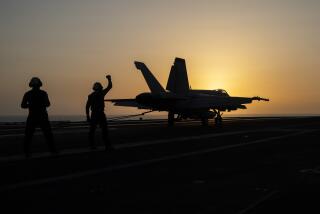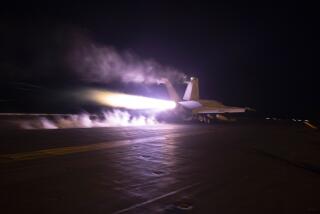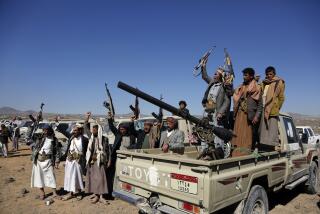U.S., Arabs Clear Mines Off Kuwait : Expert Navy Team Used in Prelude to Ship Reflagging
- Share via
KUWAIT — U.S. Navy demolition experts cleared seabed mines from the main shipping channel off Kuwait on Sunday in a prelude to the start of American naval escorts for Kuwaiti oil tankers, scheduled to begin sailing under the Stars and Stripes later this week.
In a new chapter in the nearly seven-year-old Persian Gulf conflict between Iran and Iraq, the 18-member U.S. Navy “mine countermeasures team” was deployed about 30 miles from Kuwait aboard two minesweepers from Saudi Arabia and helicopters and ships from Kuwait’s tiny navy, Western diplomats said.
The diplomats said the Navy experts removed eight explosive mines, located and identified by the Saudi and Kuwaiti navies during the last month, in a 23-mile-long channel leading from Kuwait’s offshore oil terminal at Mina al Ahmadi.
Were Serious Threat
Mines in the channel have already damaged four tankers, including a chartered Soviet ship, and they were considered the most serious threat to American shipping in the gulf.
“The Ahmadi channel has been cleared,” the Kuwaiti Defense Ministry said in a communique Sunday night, adding that the clearing was carried out by Kuwaiti naval units with U.S. and Saudi assistance.
The mines, reportedly made by the Soviets, were believed to have been planted in recent months by Iranian forces operating from speedboats.
The minesweeping operation came against a backdrop of increased saber-rattling by Iran, which announced it is starting military maneuvers in the gulf next month.
Warning to Superpowers
The official Iranian news agency said the maneuvers are intended “as a warning to the superpowers” and to demonstrate the military prowess of Iran’s Revolutionary Guards.
The August maneuvers appear timed to coincide with the second phase of the U.S. escort plan. The first Kuwaiti vessel re-registered under the American flag, the 401,000-ton Bridgeton now lying off the port of Khawr Fakkan in the Gulf of Oman, is expected to set sail into the Persian Gulf on Tuesday or Wednesday.
A Revolutionary Guards official was quoted as having said that a plan for what he called “encountering” U.S. forces in the Persian Gulf and the Gulf of Oman has already been drawn up by Tehran.
Kuwait is an ally of Iraq. Both Iraq and Iran have attacked gulf shipping during their so-called “tanker war.”
In a related development, Iran’s foreign minister, Ali Akbar Velayati, was quoted as saying that Iran would not accept a proposed U.N. Security Council resolution calling for an immediate cease-fire between Iran and Iraq.
The resolution has garnered the support of all five permanent members of the Security Council--the United States, the Soviet Union, Britain, France and China. It calls for a mandatory arms embargo against either party that fails to accept the cease-fire. Action on the resolution is expected at the United Nations this week.
“Stressing that Iran will in no way accept the proposed draft resolution of the Security Council, Velayati said that approval of the resolution will hamper U.N. Secretary General Javier Perez de Cuellar in pursuing his effective and positive efforts” to end the war, the Iranian press agency said.
Step to Cease-Fire
Western diplomats here have speculated that a de facto cease-fire in the gulf may result from the resolution. According to the diplomats, Iraq is likely to observe the cease-fire rather than be tainted as the villain, removing Iran’s justification for hitting Kuwaiti-bound shipping. The Iranians in the past have been careful to attack shipping only after Iraq has hit Iranian oil facilities or shipping.
Western diplomats said that work to remove the seabed mines off Kuwait was delayed by several days because of rough seas.
The U.S. Navy team was reported to have used sophisticated sonar equipment in the removal process, but no U.S. Navy ships or helicopters were involved in the operation.
The mining of the deep-water Ahmadi channel had forced tankers to use shallower channels to reach Kuwaiti waters, increasing the risk of running aground.
The diplomats said that there will continue to be regular patrols and regular minesweeping operations by the Kuwaiti and Saudi Arabian ships to prevent Iranian forces from placing new mines.
The presence of Saudi minesweepers showed the increased willingness of gulf Arab states to close ranks with Kuwait in the current crisis.
Saudis Remained Neutral
Until recently, the Saudis had attempted to remain neutral. However, flights of airborne reconnaissance planes from Saudi Arabia with American crews have been taking place for several years and have led to the downing of at least one Iranian warplane by Saudi fighters.
The diplomats said Iran apparently does not now have any Silkworm missiles, which were obtained from China, deployed at the entrance to the Strait of Hormuz at the mouth of the gulf, where American shipping could be an easy target in the relatively narrow waterway.
More to Read
Sign up for Essential California
The most important California stories and recommendations in your inbox every morning.
You may occasionally receive promotional content from the Los Angeles Times.










